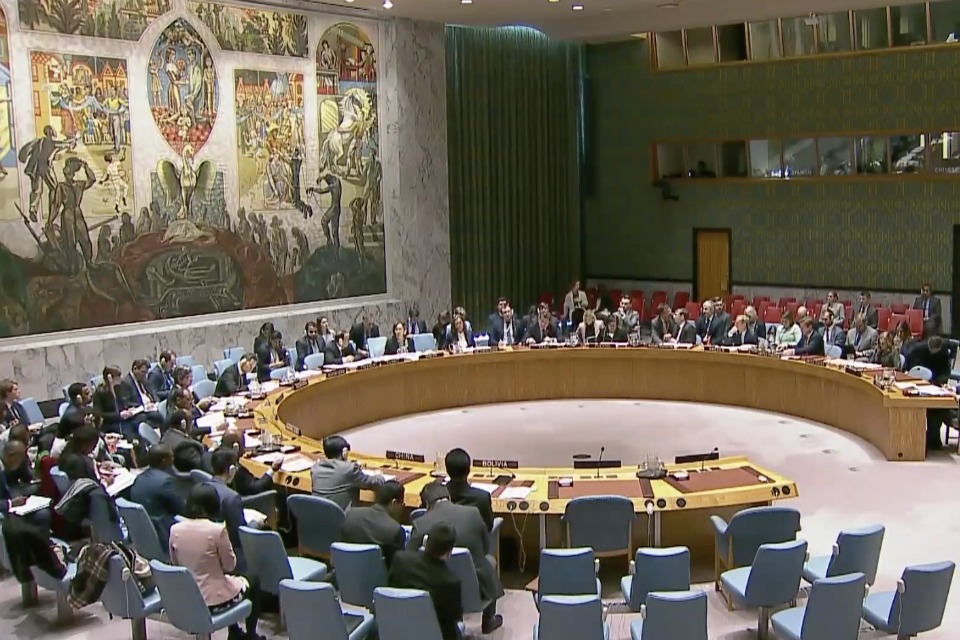Call to redouble efforts to defeat Daesh
Statement by Stephen Hickey, Acting Deputy Permanent Representative to the UN, at a Security Council Briefing on terrorism.

Thank you Mr President,
And thank you Under-Secretary-General Voronkov for your briefing and for the Secretary-General’s report.
Mr President,
Since 2014, Daesh has lost 98% of its territory and the Global Coalition has liberated more than 7.7 million people from Daesh’s rule in Iraq and Syria. The UK is proud of the role we’ve played, conducting more than 1,600 airstrikes in Iraq and Syria, training more than 60,000 Iraqi Security Forces, and supporting counter-Daesh operations with nearly 1,400 UK personnel in the region.
In addition to winning the war, we are working to win the peace by supporting stabilisation and the humanitarian response. The UK has committed $3.4 billion to the Syrian crisis since 2012. In Iraq, we have committed $320 million in humanitarian aid, $418 million in loan guarantees through the World Bank to support fiscal stability and economic development, and nearly $35 million to support stabilisation.
But, Mr President, we cannot afford to be complacent.
As the Secretary-General’s report highlights, Daesh is weakened and fragmented, but around the world we continue to face a grave threat from individuals and cells affiliated to Daesh, or those inspired by them. The continued threat of terrorism is unfortunately something we’ve felt personally in the UK.
As we think of the victims of terrorism around the world, we must redouble our efforts to defeat Daesh for good.
First, we must continue and step our efforts to tackle terrorist misuse of the internet. We are already making strides in this fight online. The event last September, led by Prime Minister Theresa May, alongside President Macron and Prime Minister Gentiloni, was a landmark achievement bringing states and industry together to tackle the threat. Daesh propaganda output has fallen by more than half since its peak and sympathizer accounts are being taken down faster than ever before. The UK’s first-of-its-kind terrorist content referral unit has worked with tech companies to take down over 300,000 posts. But we need to do much more to make sure that we have the tools and technology to remain ahead of the terrorists.
Building on the establishment of the global internet forum to counter terrorism, we are seeking to encourage tech companies to take responsibility themselves for terrorist content uploaded to the internet. Terrorist content must be taken down rapidly, limited in circulation and prevented from being made available to users in the first place. Larger companies need to support and spread best practice to smaller companies.
Second, we must strengthen our collective ability to counter the threat of returning and relocating foreign terrorist fighters, rightly highlighted by the Secretary-General’s report, and a focus of UNSCR 2396. We are encouraged that more than 60 countries are now working to build upon INTERPOL’s global database, currently tracking 43,000 fighters. But there is more that states around the globe must do to strengthen border security, including work on Advance Passenger Information, Passenger Name Records, and biometrics. We must also do more work on developing effective prosecution, rehabilitation, and reintegration strategies, paying special attention to the particular challenges posed by women and children returnees.
Third, the UK remains committed to enhancing aviation security to counter terrorism, building on this council’s resolution 2309 in 2016. To do this, the UK is investing in the development of new technology, as well as working with partners around the world. We also welcome the agreement of ICAO’s new Global Aviation Security Plan last October and we call on ICAO and all states to ensure that it is fully implemented.
Finally, I want to reiterate the UK’s support for the Secretary-General’s reform of the UN counter-terrorism architecture and for the Office of Counter Terrorism under the leadership of Under Secretary-General Voronkov. We welcome the initial steps taken to enhance coherence within the UN system, especially the commitment to work closely with CTED and Executive Director Coninsx. We look forward to OCT developing greater ability to support states, in particular in areas where the UN can add unique value, such as in the prevention of violent extremism.
In conclusion, Mr President, as this report outlines, the threat of terrorism is pervasive and evolving. But in the same way the Global Coalition brought so many of us together against a common enemy in Daesh, we must remain united to meet these new threats. This is a global threat, and it will require global action.
Thank you.